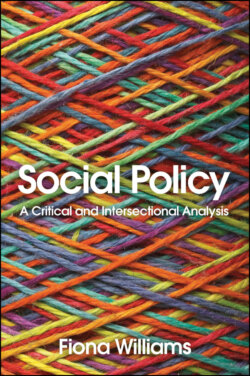Читать книгу Social Policy - Fiona Williams - Страница 6
A Note on Terminology
ОглавлениеTerminology changes. This is especially the case where those social categories constituted through social relations of power and inequality are the focus of contestation. An important first principle is to respect the terms that members of social categories prefer to use to describe how they identify while recognizing that these terms will vary. For example, in the UK, disability studies uses the term ‘disabled people’ whereas many international organizations such as the United Nations refer to ‘persons with disabilities’. Another example is the acronym LGBTQI+, which refers to sexual orientation (lesbian, gay and bisexual) as well as gender identity (queer, transgender, and intersex), while ‘+’ allows for differences within, across and outside those categories. A second guideline is to avoid terms that deprive groups of their personhood, such as ‘the poor’ or ‘the elderly’. It is more humanizing to talk of ‘older people’ or ‘people living in (or with) poverty’. A third consideration is how to employ those general terms – race, disability, gender – which register the political significance of relations of power without homogenizing the experiences of racism, sexism, disability, and so on. This is particularly an issue for race, where, to begin with, it is important to be clear that the concept is a social construct and not based upon any biological or essentialist difference. For that reason it is often placed within quotation marks as ‘race’. Accepting its social construction enables analysis of how race is given meaning over time and place. This book is particularly concerned with processes of racialization in social politics – that is to say, how groups come to be defined as racial subjects and the unequal power relations and inequalities that contribute to and flow from these processes. The concept of racialization allows an understanding that racism operates in various ways, constructing difference through culture, religion, ethnicity, nationality, citizenship status or language, as well as intersecting with class, gender, sexuality, disability, etc.
The adjective Black (capitalized) is often used as a political attribute rather than a description (Black Lives Matter). However, in analysis of race, racism and racialization it is important to recognize multiple identities and heritages which are constituted through experience, geographical and cultural heritage, faith and national citizenship (such as African Caribbean, Black British or British Asian). As well as people from the countries of Asia, Africa, the Caribbean, Central and Latin America, the Middle East and Oceania, historically and today in the UK racism is directed at Gypsies and Travellers, Jewish, Turkish and Irish people, and recent migrants from Central and Eastern Europe.
Recently the use of the term BAME (Black, Asian and Minority Ethnic), or BME (Black and Minority Ethnic), has become standard by public bodies and services and in statistical data. It has replaced ‘ethnic minorities’ as an administrative category. Its advantage is that it recognizes a degree of multiplicity, and, in the use of the phrase ‘minority ethnic’ (rather than ‘ethnic minority’), it acknowledges that all people, not just minorities, have an ethnicity. The downside is that, in becoming an administrative category, it tends to a static and homogenizing implication devoid of political meaning. Avoiding this means using the term in a context which refers to its multiplicity and political meaning. The term ‘people of colour’, which derives from the US, is preferred by some to acknowledge their social and political collectivity. In this book, I have used different terms in different contexts and, when referencing studies or statistics, I have followed the terms used in the source material. I have employed the adjective ‘white’ except in those places where the source material has referred to ‘White’ as a group. Notes on equality and diversity in use of language can be found on the British Sociological Association website: www.britsoc.co.uk/Equality-Diversity/.
